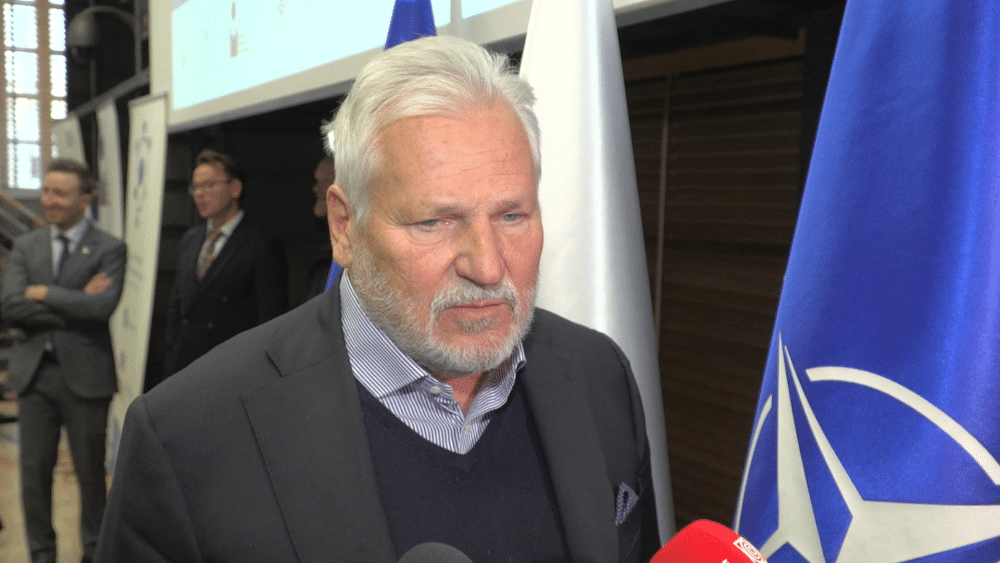Poland is celebrating its 25th anniversary of joining NATO this week. According to a survey conducted by CBOS, 60 percent of Poles consider this event as a historical milestone, and 90 percent of the population supports Poland’s membership in the Alliance. Analysts point out that pro-NATO attitudes have never been as pronounced as they are now, undoubtedly a result of Russian aggression towards Ukraine. The onset of war along Ukraine’s eastern border has also spurred Poland to increase their efforts and spending to bolster their defense capabilities. “Poland is certainly one of the more significant, influential NATO countries at the moment,” assessed Alexander Kwaśniewski, the President of Poland from 1995 to 2005, in a conversation with journalists.
In 2022, Poland passed a Homeland Defense Act that primarily aims to expand the Armed Forces to at least 300,000 soldiers, including 250,000 professional soldiers and 50,000 territorial defense soldiers. The Act also seeks to rebuild the reserve system and enhance soldier training capacities. With the new regulations, state expenditures on defense are also increasing. Last year, it was approximately 4 percent of the GDP, which positions Poland as one of the NATO leaders.
“Poland is doing a lot to strengthen its position in NATO. We are developing economically because it is very important, but we should have more political stability and continuity. We also need to modernize the army, allocate funds to it, train soldiers, and strengthen our armaments industry, which means we need to be producing more in correlation with other European countries. We also need to strengthen civil defense by informing people in Poland about basic actions in threat situations. There is a lot to do, but it must be said that Poland has already done a lot. We have a good army, tested officers and soldiers, and we have participated in various overseas missions: Afghanistan, Iraq, and previously Kosovo,” said Alexander Kwaśniewski.
On March 12, 1999, the then-Polish Foreign Minister, Bronisław Geremek, handed over the treaty of accession to the NATO to the US Secretary of State, Madeleine Albright. A survey conducted by CBOS in February this year showed that 60 percent of Poles consider this to be a historic event. This is the highest result in the history of such surveys. On the eve of the accession in February 1999, 44 percent of respondents held this view, and in a survey conducted in 2019, it was 42 percent. CBOS also noted that pro-NATO attitudes have never been as widespread in Polish society as they are now. Currently, a whopping 90 percent of Poles support Poland’s NATO membership. In March 2022, shortly after the outbreak of war, this percentage was even higher, at 94 percent.
Russian aggression against Ukraine not only changed attitudes towards NATO in Poland and NATO member countries but also in countries that previously remained neutral. According to Alexander Kwaśniewski, the accession of Finland and Sweden to NATO is a failure for Putin.
“Putin did everything for Russia to be surrounded by countries that are not in NATO, but his aggression against Ukraine resulted in Finland and Sweden now being in NATO. From a political point of view, it is also important that Sweden renounced its neutrality policy that had been in place for over 200 years and to which they seemed very attached. Sweden is a wealthy, well-organized country that has a high-level arms industry, a good army, a good civil defense system, and serious politicians. There, NATO is widely agreed upon from the left to the right. So I think that from NATO’s point of view, this is also a historic event; it is a major strengthening of the Alliance,” says the former president.
On Thursday, March 7, the Swedish prime minister, Ulf Kristersson, and the chief diplomat, Tobias Billström, officially handed over their accession documents to the US. As a result, Sweden officially became the new 32nd NATO member, and its territory is covered by the collective defense guarantee under Article 5 of the North Atlantic Treaty.
Sweden had applied for NATO membership back in May 2022. At that time, Finland also made the same decision, officially becoming the 31st NATO member a bit earlier – on April 4 last year, on the 74th anniversary of the creation of NATO. Commentators evaluate that this expansion of NATO structures is a scenario that seemed unreal just a few years ago. When journalists asked who should join the Alliance next, Alexander Kwaśniewski answered without hesitation: Ukraine.
“If we want to offer Ukraine a security guarantee honestly, it is NATO membership. No other paper, no other declaration will be accepted because Ukrainians have the experience of the Budapest Memorandum from 1994. The most influential countries in the world signed it, and in 2014, it turned out to be just a scrap of paper. In 2022 – with Russian aggression – no one even mentions it, although such guarantees were given by Russia, the United States, and France, all members of the Security Council. So if I were to say clearly, I believe Ukraine is next, and it will be a tremendous reinforcement both for Ukraine and NATO,” Kwasniewski stressed.
On the occasion of the 25th anniversary of Poland joining NATO, the Atlantic Council and the Faculty of Political Science and International Studies of the University of Warsaw organized a conference on March 8. The guests included former Polish President Alexander Kwasniewski, former Prime Minister and MEP Professor Jerzy Buzek, and Foreign Minister Radosław Sikorski. The foreign minister highlighted that Russia under Putin’s rule is an existential threat to Poland and expressed hope that Ukraine will also join NATO someday.
